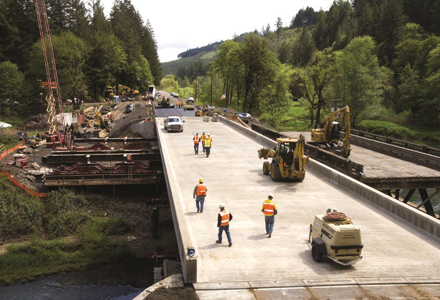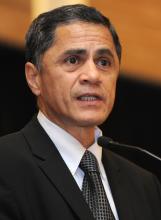In 2002, bridge conditions in the State of Oregon were declining. Projections were made that 30% of Oregon's bridges would have weight restriction within 8-years, causing a productivity loss to Oregon's economy of US$123 billion including 88,000 jobs. By 2012, Oregon’s State Bridge Delivery Program had been recognized nationally and internationally with awards for excellence and innovation, most recently scooping IRF’s Global Road Achievement Award for Quality Management.

In 2002, bridge conditions in the State of Oregon were declining. Projections were made that 30% of Oregon's bridges would have weight restriction within 8-years, causing a productivity loss to Oregon's economy of US$123 billion including 88,000 jobs.
By 2012,What happened during the intervening decade?
Oregon’s DOT (ODOT) decided to embark on the largest and most complex transportation program in their history: a $1.3 billion effort to replace and repair 271 bridges throughout the state.
This eight-year program began in 2004; using both conventional and design-build contract delivery on 85 separate construction contracts. To meet a key program goal of maintaining freight mobility and traffic flow, a state-wide corridor management framework was used in the planning and implementation.
Recognising both the need for specialised expertise and the resource limitations within ODOT, the funding legislation (Oregon Transportation Investment Act…or OTIA III) mandated the outsourcing of the Program Management role. This allowed ODOT to focus its limited resources on providing a leadership role within the program, while conducting due-diligence oversight of the program management. With only 22 available staff to provide this function, a cost-effective and efficient quality oversight process had to be implemented to help ensure program goals were met.
To assist ODOT with this challenge,
Using a risk-based strategy coupled with a systematic approach aligned with ISO 19011 processes, a small staff of trained quality management professionals were able to support ODOT staff in the oversight of the programme. Meanwhile this delivered effective measurable improvements in the management of the programme, resulting in continuous process improvements being achieved.
IRF’s Award for Quality Management was formally presented to Delcan and ODOT by IRF executive vice-president Mike Dreznes at a special ceremony on March 21, 2012.





